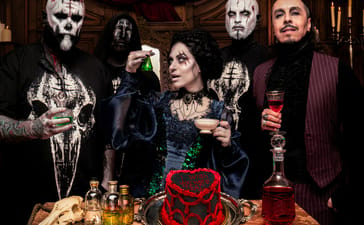In 2007, being a fan of a band like Paramore meant begging your mum to let you dye your hair red, while belting out Misery Business (badly) in your bathroom, and scrawling lyrics on your Converse. In 2025, being a music fan is taking on a different meaning.
From decoding lyrics, dissecting social media posts, and demanding explanations about musicians’ personal lives band lineups, somewhere between the Myspace era and the TIkTok one, fandom has turned into a parasocial surveillance and psychological analysis. Creative art is now being taken to literal extremes and the lines between loving a band and ‘owning’ them have become seriously blurred by stan culture.
The rise of parasocial fandoms
When Hayley Williams released Ego Death At A Bachelorette party, many Paramore fans went into a pre-emptive mourning. With many songs hinting towards a breakup between Hayley and her long-time bandmate and partner Taylor York, fans began to intensely speculate that Paramore was over.
When Hayley herself confirmed the band hadn’t called it quits, many still assumed the lineup would change. How could Hayley and Taylor – who have not yet confirmed or denied if they’ve broken up – continue on in a band after such a bitter breakup?
The thing is, we don’t know if it was bitter. We don’t know if Hayley still ran every song past Taylor, before she released singles like ‘Parachute’ and ‘Good Ol’ Days’. We don’t know if they’re talking or in no contact, or if they’re having a laugh behind closed doors, or if they broke up but remain great friends. But it hasn’t stopped fans flooding TikTok comments, Reddit threads, and other social media posts to question what the fuck Taylor did to Hayley and wail about their ‘parents’ getting a ‘divorce’.
Stan culture is toxic and our favourite musicians are suffering because of it
In 2023, Noah Sebastian of Bad Omens deleted his personal social media accounts and went offline. He had been pretty active in previous years, engaging with fans, posting music updates, and using Twitch to connect with people.
As Bad Omens exploded in popularity, things got increasingly more uncomfortable for the frontman as he tried to navigate a new level of fame.
Upon deleting his accounts, he said. “I got tired of seeing my own face, or seeing a stranger’s opinion of me every day. I don’t think that’s healthy.”
“I’ve seen these accounts that collect baby pictures of me from a distant relative’s Facebook and make an entire shrine of them. It’s very one-sided, you know.”
Stan culture – the hyper intense, parasocial devotion that’s now labelled as support – may start because of a love of the music, but it can get increasingly toxic as fans try to stake ownership over their favourite acts. With such an intense scrutiny and pressure on artists’ personal lives now due to fans feeling like they personally know them, are fandoms now actually killing the relationship between artists and their fans?
Sleep Token’s shroud of mystery over the years has also turned some of their fanbase obsessive, as people try to uncover the men behind the masks, particularly lead singer ‘Vessel’ who they also often sexualise. While each album loosely follows a character or conceptual theme, earlier this year Sleep Token released ‘Caramel’ a song that people soon realised was about, well, them.
Realising it wasn’t Vessel speaking to them anymore, but more likely the real identity of the man behind the mask (who we won’t disclose here), lyrics include, ‘Every time they try to shout my real name just to get a rise from me, acting like I’m never stressed out by the hearsay, I guess that’s what I get for tryna hide in the limelight, guess that’s what I get for having 20/20 hindsight.’
Stan culture isn’t new, but it’s shifted
This behaviour, of course, is not entirely new. Back in the ‘00s emo wave, fans often used fan forums and MySpace to chat music, decode the personal lives of their favourite bands, and even project their fantasies upon them.
From deeply personal and explicit fan fiction tales of Gerard Way and Frank Iero of My Chemical Romance (and even incest-themed fictional tales of Gerard and his brother Mikey), to fans speculating the real reason that Ryan Ross left Panic! At The Disco was because he and Brendon Urie had an explosive breakup, the personal lives of our favourite artists have never exactly been safe.
And some may argue because they’re in the spotlight, that it’s impossible for their private lives to remain completely private. But there is also a point where fans need to realise the boundaries have become far too blurred and step back from the intensely personal feeling that you know, or are friends, with your favourite musicians.
Loving an artist for their relatability, saving your life, or providing escapism is one thing. When your favourite band makes you feel seen, it’s hard to separate the art from the person, even when you should.
Maybe the problem isn’t that fans care too much — it’s that they forget they’re not actually part of the story. Artists don’t owe us emotional access just because their lyrics once saved our lives.
Our favourite musicians deserve space
And now, other than the artists, everyday fans are also suffering from the obsessive stan-like culture. The online communities meant to celebrate music now feel like preparing for battle, where everyone’s busy proving who the ‘real’, moral or most educated fan is. It’s exhausting. And it’s killing the vibe of just enjoying the music.
Turning on others in the fandom, becoming barricade bandits (IYKYK), sexualising your favourite artists and projecting fantasies onto them, and targeting individuals like partners or families of the musicians is taking things way too far.
Stan culture has blurred the lines between admiration and obsession but there’s still time to implement the boundaries. Maybe being a fan moving forward isn’t about having to know everything – it’s about giving our favourite musicians the space to exist and create.
Loving a band shouldn’t be monitoring their every move or demanding access to their personal lives. It should mean screaming the lyrics at a show, bonding with other fans over a shared love of your favourite songs, feeling something real, and then letting them walk offstage in peace.










